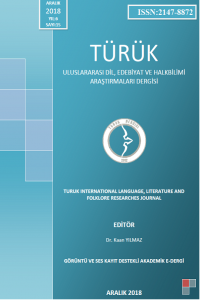AŞKIN YAKICILIĞINDAN AKLIN AYDINLIĞINA: TANZİMAT SONRASI TÜRK ŞİİRİNDE ATEŞ İMGESİ
Ateş aydınlatıcı olması bakımından akıl ile benzerlik taşımaktadır. Promete mitinde Prometheus’un tanrılardan çaldığı ateş; insanın yeryüzünde kendi medeniyetini inşa etmesi için gerekli aklı ve bilgeliği sembolize etmektedir. Aydınlanma çağı ile Batı medeniyeti bu aklı rasyonalite şeklinde algılayarak aklın nesnel gerçeklikleri algılayan “ration” boyutunu hayatın merkezine yerleştirmiş, aklın hakikatleri idrak eden “reason” boyutunu köreltmiştir. Böylece aklı ration’ın boyunduruğuna veren Batı, hakikati inkâr ve ret yoluna girmiştir. Tanzimat sonrası Batı medeniyeti ile daha yakından irtibat kurmaya çalışan Osmanlı şairleri toplumun içinde bulunduğu durağan yapıyı değiştirmek için şiirlerinde dini ve içtimai meseleleri işlemişlerdir. Bu meselelere yaklaşımı ise akıl perspektifinden olmuştur. Çalışmamızda, Batı medeniyetinin etkisiyle aklı merkeze alan Osmanlı şairlerinin aklı “ration” ve “reason” bağlamında nasıl algıladıkları ve bu akıl mefhumunu ateşle ilgili imgelerle şiirlerinde nasıl işledikleri üzerinde durulacaktır.
FROM THE TORRIDITY OF LOVE TO ENLIGHTENING OF REASON: FIRE IMAGE IN TURKISH POEM AFTER TANZİMAT PERIOD
Fire is related with reason as it is an enlightening element. In the myth of Prometheus, the fire that has been stolen from Gods by Prometheus symbolizes the reason and wisdom which is essential for human being to build their civilisation on the world. With the beginning of enlightenment age the West has considered reason and wisdom as rationality. Therefore, ration which is dimension of reason and wisdom to perceive practical and objective realities of the world has been important in the life of western communities. The dimension of reason and wisdom which is able to comprehend the truth has ignored. The West, thereafter, denied the truth from the perspective of rationality. After the declaration of Tanzimat, ottoman poets who are interested in social problems, and are in touch with western ideas, started to bring social and religious issues into their poems in order to raise awareness about the socio- political condition of Ottoman society. They tried to evaluate this condition of society from the perspective of reason and wisdom. In this research, it is intended to figure out how ottoman poets percept those concepts, “ration” and “reason”, in their poems throughout Tanzimat period. It is, also, aimed to analyze how they handle those concepts through the images about fire.
___
- AKAY, Hasan; Tanzimat Sonrası Türk Edebiyatında Yeni Fikirler, Kitabevi, İstanbul, 1998.
- ERHAT, Azra; Mitoloji Sözlüğü, Remzi Kitabevi, İstanbul, 2012.
- CAN, Şefik; Klasik Yunan Mitolojisi, Ötüken Neşriyat, İstanbul, 2012.
- İNDİRKAŞ, Zühre; “Hesiodos’tan Goethe’ye Prometheus Mitologemi”. Tiyatro Eleştirmenliği ve Dramaturji Bölümü, S 7, s. 107- 120, İstanbul, 2005.
- KAPLAN, Mehmet; Türk Edebiyatı Üzerinde Araştırmalar I, Dergâh Yayınları, İstanbul, 2006.
- GÖÇGÜN, Önder; Ziya Paşa’nın Hayatı, Eserleri, Edebi Şahsiyeti ve Bütün Şiirleri, Kültür ve Turizm Başkanlığı Yayınları, Ankara, 1987.
- GÖÇGÜN, Önder; Namık Kemal’in Şairliği ve Bütün Şiirleri, Atatürk Kültür Merkezi Başkanlığı Yayınları, Ankara, 1999.
- NÂCİ, Muallim; Muallim Nâci’nin Şiirleri, (Haz. Yrd. Doç. Dr. Abdulkadir Hayber ve Yrd. Doç. Dr. Hüseyin Özbay), MEB Yayınları, İstanbul, 1997.
- PALA, İskender; Ansiklopedik Divan Şiiri Sözlüğü, LM Yayınları, İstanbul, 2004.
- ŞERİATİ, Ali; Medeniyet Tarihi II, Fecr Yayınları, Ankara, 2011.
- ŞİNASİ, İbrahim; Müntahabât-ı Eş’ar, (Haz. Süheyl Beken), Dün- Bugün Yayınevi, Ankara, 1960.
- Başlangıç: 2013
- Yayıncı: Yasin ŞERİFOĞLU
Sayıdaki Diğer Makaleler
VRAPÇİŞTE (MAKEDONYA) TÜRK ATASÖZLERİ
ÇAĞDAŞ ARNAVUTÇADA TÜRKÇE KÖKENLİ ALINTI KELİMELERDE GÖRÜLEN FONOLOJİK DEĞİŞİMLER
TÜRKÇEDE ALIŞMAK ANLAMLI KELİMELER YAPILARI VE ANLAM İLKİŞKİLERİ
İBN-İ ÂDİL MELHAMESİ VE METNİN SÖZ VARLIĞI ÜZERİNE
MUHİBBÎ DÎVÂNI’NDA AŞK VE ÂŞIK
TÜRK YAZI DİLLERİNDE SÖZ DİZİMLİK BİRİMLER ARASINDAKİ ANLAM İLİŞKİLERİ
AŞKIN YAKICILIĞINDAN AKLIN AYDINLIĞINA: TANZİMAT SONRASI TÜRK ŞİİRİNDE ATEŞ İMGESİ
TÜRK DİLİNİN ÇAĞDAŞ DİYALEKTLERİNDE CEVHERÎ EK FİİL OLARAK +(B)O(L)-
